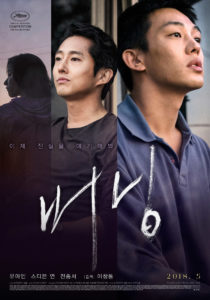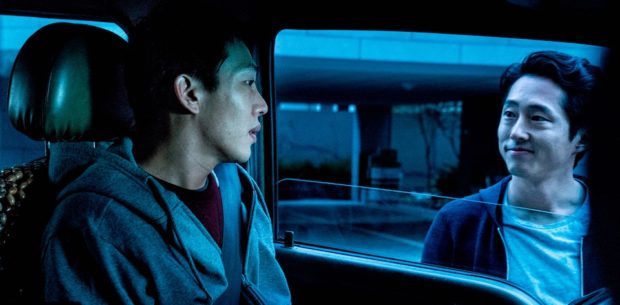Adaptations of Haruki Murakami’s works have always been a bit problematic. Take Norwegian Wood, for example, which struggled to imbue an emotional flat film with the author’s unique narrative perspective. Lee Chang-dong’s BURNING (버닝) has added task of expanding an 18-page short story into a feature.
The film is based on Murakami’s short story “Barn Burning,” which appears in the collection The Elephant Vanishes. While out on delivery, Jongsu (Yoo Ah-in) encounters Haemi (Jong-seo Jun), who reminds him they were neighbours in the past. After a brief sexual encounter, Haemi heads to Africa for a trip, leaving Jongsu in charge of feeding a possibly fictional cat. When she returns with the rich boyfriend Ben (Steven Yeun), the dynamic changes for a confused Jongsu.
Much of the first half of the film is about creating mood. Backed by the atmospheric score from South Korean composer Mowg, who collaborated with Kim Jee-woon on I Saw the Devil and The Age of Shadows, we bear witness to lots of lingering shots of Jongsu popping over to Haemi’s empty apartment to have a melancholy wank. With the introduction of Ben, and an alarming confession, the focus shifts to creating a sinister field around the rich stranger.
As an odd relationship forms between the couple and perpetual third-wheel Jungsu, Lee Chang-Dong and Oh Jung-Mi’s script also pads out Murakami’s slender story with superfluous backstory. Jongsu’s father, for example, is on trial for a violent crime. It might telegraph a darker side to Jongsu’s DNA lurking just under the surface, but it’s one of several garden paths that don’t stand up to fridge logic.
It is held together by some captivating performances. Although a bit of a lonely doormat for much of the first act, Yoo Ah-in is a likeable enough lead. All of the attention will no doubt be on The Walking Dead‘s Steven Yeun, who’s creepy smiles and rich boy indifference lean in the direction of Patrick Bateman. Yet it’s the captivating Jong-seo Jun who makes the most impact, even if the not so subtle commentary on gender fails to pay off before her sudden departure.
The haunting photography of Hong Kyung-pyo (Snowpiercer, Haemoo) is superb as well. The cool-tinted lenses often portray the characters in a half-light, a visual indicator of their ambiguity. There’s shots of Jongsu jogging through a blue mist that evokes not only his isolation, but a deeper mystery that will never be resolved satisfactorily.
As the bloated back half turns into a mystery, with the disappearance of Haemi, it simply follows the more traditional conventions of a psycho thriller. It’s here Lee Chang-Dong’s BURNING goes off-book and straight into mediocrity. As the audience and Jongsu alike begins to question everything they have ever known, the film holds your hand and makes sure that you notice all those dots sitting really close together. So after the slow-burning fire culminates in a ‘surprise’ ending, we’re left with nothing more than an ashen frame.
[stextbox id=”grey” bgcolor=”F2F2F2″ mleft=”5″ mright=”5″ image=”null”] 2018 | South Korea | DIR: Lee Chang-Dong | WRITER: Lee Chang-Don, Oh Jung-Mi | CAST: Yoo Ah-in, Steven Yeun, Jeon Jong-seo | DISTRIBUTOR: Palace Films, Sydney Film Festival (AUS) | RUNNING TIME: 148 minutes | RELEASE DATE: 16 June 2018 (SFF) [/stextbox]
2018 | South Korea | DIR: Lee Chang-Dong | WRITER: Lee Chang-Don, Oh Jung-Mi | CAST: Yoo Ah-in, Steven Yeun, Jeon Jong-seo | DISTRIBUTOR: Palace Films, Sydney Film Festival (AUS) | RUNNING TIME: 148 minutes | RELEASE DATE: 16 June 2018 (SFF) [/stextbox]







